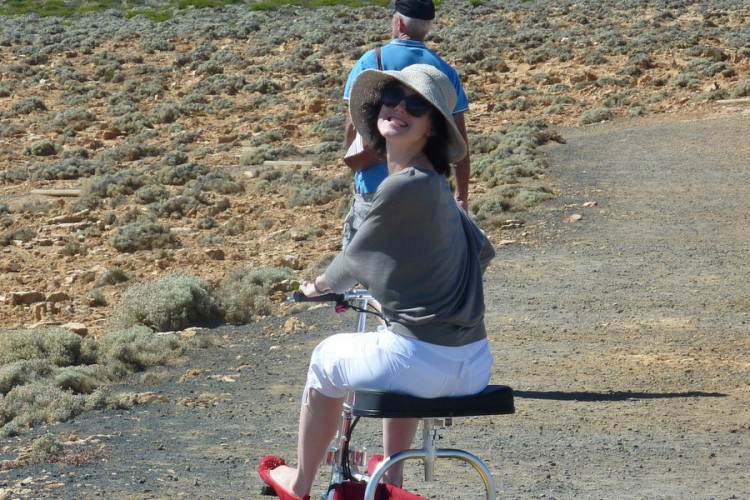Getting through airport security screening with my mobility scooter always presents some challenges.
The lithium-ion battery is the subject of much discussion and serious facial expressions; the requisite explosives test must be performed; there are endless questions about why I am traveling with the scooter and the odd (old) joke: “I wish I could have one of those.”
It’s a repeatable playbook I could recite in my sleep.
The only thing that still has the power to surprise me is the depth of people’s behavior and reactions towards me. I’m not sure why I’m continually caught off guard. Perhaps it’s because I operate on the belief that you treat people how you would like to be treated.
A recent incident at the airport as I saw my mother off is a prime example. We were waiting patiently for the results of the explosives test. A female security officer was hovering nearby, watching me, when suddenly, without any preamble or direct eye contact, she kicked off the following conversation:
Security officer (pointing at my mobility scooter): “I want one of those.”
Is all the originality gone from this world?
Security officer: “Why are you in THAT?”
THAT, of course, being my mobility scooter.
Me: “I have a disability.”
A myriad of expressions flashed across her face: horror, discomfort, pity.
Security officer: “I’m sorry, I’m sorry. I’m sorry I asked!”
Me: “Don’t be sorry. I’m fine.”
Security officer: “I’m sorry I asked.”
Yeah, well great, that makes two of us.
I figured the conversation was over. I was wrong.
Security officer: “But you don’t look sick. So what’s wrong with you?”
Thank you for just invalidating my condition and conveying your disbelief that my condition is real. Bravo!
Me: “I have chronic full-body nerve pain, chronic fatigue, sporadic paralysis and muscle weakness as a result of a neurological condition known as Guillain–Barré syndrome.”
I didn’t get a chance to elaborate on my big, medically wordy diagnosis any further. The security officer flailed her arms at me in that unmistakable “stop talking now” gesture.
Security officer: “I’m sorry I asked, I’m sorry I asked, I’m sorry I asked!”
Then the final kicker:
Security officer: “I feel sorry for you.”
Deep inhale and exhale. Don’t make a scene in airport security.
Me: “Don’t feel sorry for me. I don’t feel sorry for me so why should you?”
I scooted away without a backward glance.
My mom and I rehashed the encounter for a good half an hour, dissecting the conversation and trying to somehow rationalize her behavior. It made for some pretty interesting reflections:
1. Some things can’t be rationalized. They just are what they are, and we need to let it go.
2. If curiosity killed the cat, then discretion is certainly the better part of valor. It’s not appropriate to fire off just any old question that pops into your mind, no matter how burning a desire you have to know the answer.
3. People really shouldn’t ask questions that they don’t want to or aren’t prepared to hear the answers to.
4. From an outsider’s perspective, it’s easy to look at disability and think it’s something to be sorry for. The presumption that disability defines a person and should elicit some sort of pity or regret really needs to change.
5. Anyone can become disabled at any point in time. My perceived misfortune makes people more aware of their own mortality and life’s fragilities. It confronts them with the possibility that it could, in the blink of an eye, just as easily be them. And it scares the sh*t out of them.
So to the strangers I have yet to meet:
I am the girl with the walking sticks.
I am the girl who rides around on her kick-ass mobility scooter.
I am the girl who is so much more than the sum total of the visual impression you get when you first meet her.
I am the girl who is living an amazing life, enjoying it the best way she knows how.
The people who describe me using words like brave, determined, adaptable and courageous know I am that girl because of my journey, not in spite of it.
So please, don’t tell me you feel sorry for me. Don’t tell me you shouldn’t have asked. Don’t apologize for who I am. Don’t apologize for what makes me different.
I’m not sorry, not one little bit. You shouldn’t be either.
A version of this post originally appeared on Starbrite Warrior.


